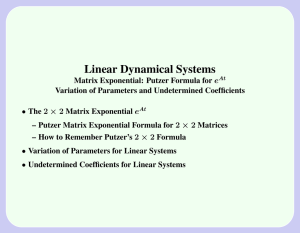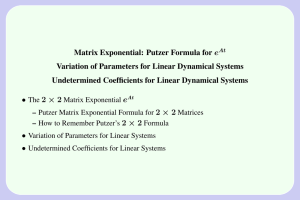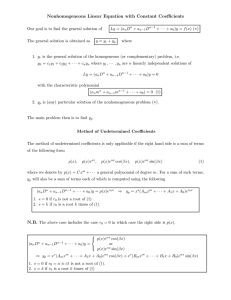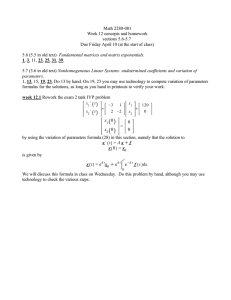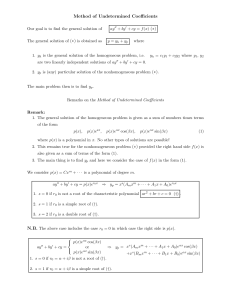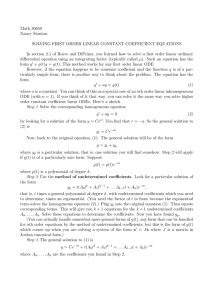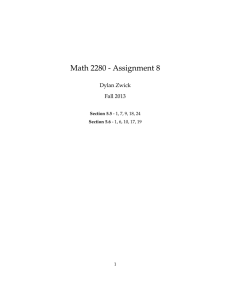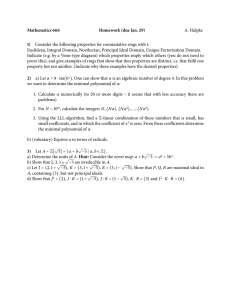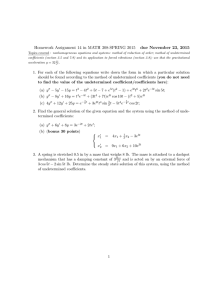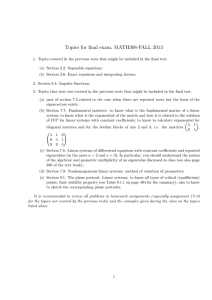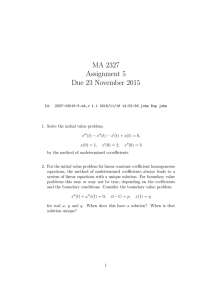Matrix Exponential: Putzer Formula Variation of Parameters for Systems
advertisement
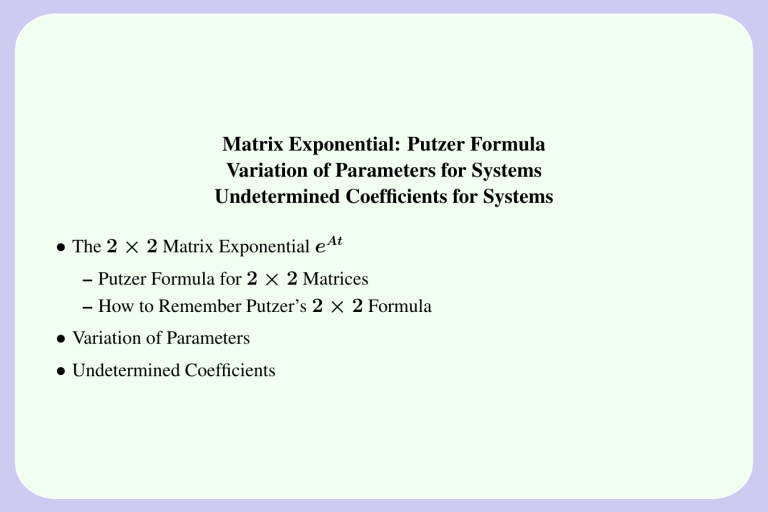
Matrix Exponential: Putzer Formula
Variation of Parameters for Systems
Undetermined Coefficients for Systems
• The 2 × 2 Matrix Exponential eAt
– Putzer Formula for 2 × 2 Matrices
– How to Remember Putzer’s 2 × 2 Formula
• Variation of Parameters
• Undetermined Coefficients
The 2 × 2 Matrix Exponential eAt
The matrix eAt has columns equal to the solutions of the two problems
0
0
u2(t) = A~
u2
(t),
u1(t) = A~
u1
(t),
~
~
0
1
u2(0) =
u1(0) =
~
~
0
Briefly, the matrix Φ(t) = eAt satisfies the two conditions
1. Φ0 (t) = AΦ(t),
1 0
2. Φ(0) =
.
0 1
1
Putzer Formula for 2 × 2 Matrices
e
At
eAt
eAt
λ1 t
e λ1 t − e λ2 t
(A − λ1I)
λ1 − λ2
= eλ1tI + teλ1t(A − λ1I)
eat sin bt
at
= e cos bt I +
(A − aI)
b
=e
I+
A is 2 × 2, λ1 6= λ2 real.
A is 2 × 2, λ1 = λ2 real.
A is 2×2, λ1 = λ2 = a+ib,
b > 0.
How to Remember Putzer’s 2 × 2 Formula
The expressions
eAt = r1(t)I + r2(t)(A − λ1I),
e λ1 t − e λ2 t
(1)
λ1 t
r1(t) = e , r2(t) =
λ1 − λ2
are enough to generate all three formulas. Fraction r2 is the d/dλ-Newton quotient for
r1. It has limit teλ1t as λ2 → λ1, therefore the formula includes the case λ1 = λ2 by
limiting. If λ1 = λ2 = a + ib with b > 0, then the fraction r2 is already real, because
it has for z = eλ1 t and w = λ1 the form
r2(t) =
z−z
w−w
=
sin bt
b
.
Taking real parts of expression (1) gives the complex case formula.
Variation of Parameters
Theorem 1 (Variation of Parameters for Systems)
Let A be a constant n × n matrix and F(t) a continuous function near t = t0 .
The unique solution x(t) of the matrix initial value problem
x0(t) = Ax(t) + F(t),
x(t0) = x0,
is given by the variation of parameters formula
Z t
(2)
e−rAF(r)dr.
x(t) = eAtx0 + eAt
t0
Undetermined Coefficients
Theorem 2 (Polynomial solutions)
Let f (t) be a polynomial of degree k. Assume A is an n × n constant invertible
Pk
tj
matrix. Then u0 = Au + f (t)c has a polynomial solution u(t) = j=0 cj j!
of
degree k with vector coefficients {cj } given by the relations
cj = −
k
X
i=j
f (i)(0)Aj−i−1c,
0 ≤ j ≤ k.

